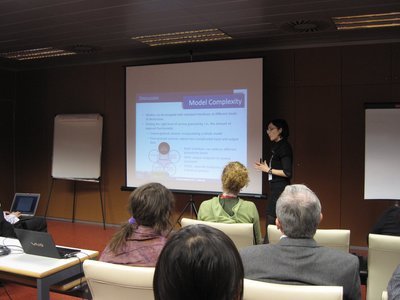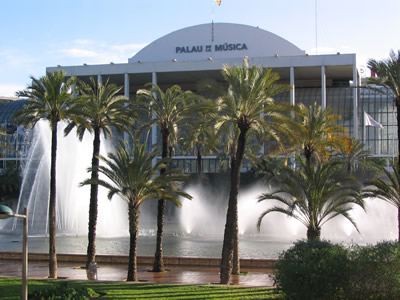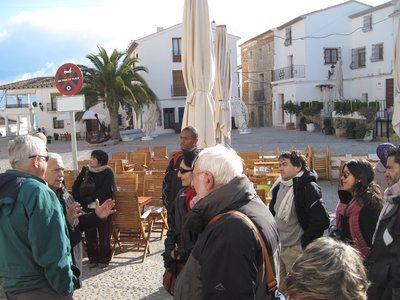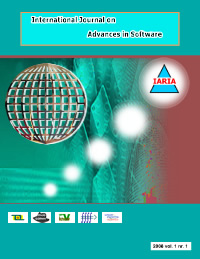COGNITIVE 2025 - The Seventeenth International Conference on Advanced Cognitive Technologies and Applications
April 06, 2025 - April 10, 2025
COGNITIVE 2025
Onsite and Online Options: In order to accommodate various situations, we are offering the option for either physical presence or virtual participation (pdf slides or pre-recorded videos).
ISSN: 2308-4197
ISBN: 978-1-68558-260-9
COGNITIVE 2025 is colocated with the following events as part of ComputationWorld 2025 Congress:
- SERVICE COMPUTATION 2025, The Seventeenth International Conference on Advanced Service Computing
- CLOUD COMPUTING 2025, The Sixteenth International Conference on Cloud Computing, GRIDs, and Virtualization
- FUTURE COMPUTING 2025, The Seventeenth International Conference on Future Computational Technologies and Applications
- COGNITIVE 2025, The Seventeenth International Conference on Advanced Cognitive Technologies and Applications
- ADAPTIVE 2025, The Seventeenth International Conference on Adaptive and Self-Adaptive Systems and Applications
- CONTENT 2025, The Seventeenth International Conference on Creative Content Technologies
- PATTERNS 2025, The Seventeenth International Conference on Pervasive Patterns and Applications
- COMPUTATION TOOLS 2025, The Sixteenth International Conference on Computational Logics, Algebras, Programming, Tools, and Benchmarking
- BUSTECH 2025, The Fifteenth International Conference on Business Intelligence and Technology
- AIVR 2025, The Second International Conference on Artificial Intelligence and Immersive Virtual Reality
COGNITIVE 2025 Steering Committee Chair
|
 |
Jaime Lloret Mauri
Universitat Politecnica de Valencia
Spain
|
|
|
|
|
 |
Jaime Lloret Mauri
Universitat Politecnica de Valencia
Spain
|
COGNITIVE 2025 Steering Committee
|
 |
Thomas Ågotnes
University of Bergen
Norway
|
|
 |
Jayfus Tucker Doswell
The Juxtopia Group, Inc.
USA
|
|
 |
Muneo Kitajima
Nagaoka University of Technology (Emeritus)
Japan
|
|
|
|
|
 |
Thomas Ågotnes
University of Bergen
Norway
|
|
 |
Jayfus Tucker Doswell
The Juxtopia Group, Inc.
USA
|
|
 |
Muneo Kitajima
Nagaoka University of Technology (Emeritus)
Japan
|
COGNITIVE 2025 conference tracks:
NEW DIRECTIONS: Hot topics on cognitive science
Neuroscience; Brain connectivity; Brain-like Computing; Neuromorphic computing; Neuromorphic devices; Brain machine interface; Interfacing via brain waves; Spiking hierarchical models; Vision sensors; Sensory modalities; Temporal approach to object recognition; Hierarchical temporal memory; Spatio-temporal event recognition; Reasoning with relative directions; Web-navigation via Cognitive Models; Mining cognitive patterns; Bag-of-Features for retrievals; Computing with symmetries; Periphery of Knowledge; Emotions and cooperation levels; Cognitive Digital Twins
BRAIN: Brain information processing and informatics
Cognitive and computation models; Human reasoning mechanisms; Modeling brain information processing mechanisms; Brain learning mechanisms; Human cognitive functions and their relationships; Modeling human multi-perception mechanisms and visual, auditory, and tactile information processing; Neural structures and neurobiological process; Cognitive architectures; Brain information storage, collection, and processing; Formal conceptual models of human brain data; Knowledge representation and discovery in neuroimaging; Brain-computer interface; Cognition-inspired complex systems; Aesthetic emotions
COGNITION: Artificial intelligence and cognition
Expert systems, knowledge representation and reasoning; Reasoning techniques, constraint satisfaction and machine learning; Logic programming, fuzzy logic, neural networks, and uncertainty; State space search, ontologies and data mining; Games, planning and scheduling; Natural languages processing and advanced user interfaces; Cognitive, reactive and proactive systems; Ambient intelligence, perception and vision; Pattern recognition
MACHINE LEARNING: Advanced topics in Deep/Machine learning
Distributed and parallel learning algorithms; Collective cognition; Image and video coding; Deep learning and Internet of Things; Deep learning and Big data; Data preparation, feature selection, and feature extraction; Error resilient transmission of multimedia data; 3D video coding and analysis; Depth map applications; Machine learning programming models and abstractions; Programming languages for machine learning; Visualization of data, models, and predictions; Hardware-efficient machine learning methods; Model training, inference, and serving; Trust and security for machine learning applications; Testing, debugging, and monitoring of machine learning applications; Machine learning for systems.
AGENTS: Agent-based adaptive systems
Agent frameworks and development platforms; Agent models and architectures; Agent communication languages and protocols; Cooperation, coordination, and conversational agents; Group decision making and distributed problem solving; Mobile, cognitive and autonomous agents; Task planning and execution in multi-agent systems; Security, trust, reputation, privacy and safety in agent-based systems; Negotiation brokering and matchmaking in agent-oriented protocols; Web-oriented agents (mining, semantic discovery, navigation, etc.; SOA and software agents; Economic agent models and social adoption
AUTONOMY: Autonomous systems and autonomy-oriented computing
Self-organized intelligence nature-inspired thinking paradigms; Swarm intelligence and emergent behavior; Autonomy-oriented modeling and computation; Coordination, cooperation and collective group behavior; Agent-based complex systems modeling and development; Complex behavior aggregation and self-organization; Agent-based knowledge discovery and sharing; Autonomous and distributed knowledge systems; Autonomous knowledge via information agents; Ontology-based agent services; Knowledge evolution control and information filtering agents; Natural and social law discovery in multi-agent systems; Distributed problem solving in complex and dynamic environments; Auction, mediation, pricing, and agent-based market-places; Autonomous auctions and negotiations
APPLICATIONS
Agent-oriented modeling and methodologies; Agent-based interaction protocols and cognitive architectures; Emotional modeling and quality of experience techniques; Agent-based assistants and e-health; Agent-based interfaces; Knowledge and data intensive classification systems; Agent-based fault-tolerance systems; Learning and self-adaptation via multi-agent systems; Task-based and task-oriented agent-based systems; Agent-based virtual enterprise; Embodied agents and agent-based systems applications; Agent-based perceptive animated interfaces; Agent-based social simulation; Socially planning; E-Technology agent-based ubiquitous services and systems
Deadlines:
Submission | Jan 20, 2025 |
Notification | Feb 16, 2025 |
Registration | Feb 28, 2025 |
Camera ready | Mar 05, 2025 |
Deadlines differ for special tracks. Please consult the conference home page for special tracks Call for Papers (if any).





































